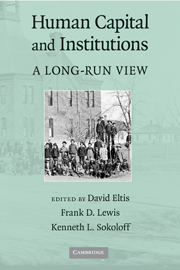Book contents
- Frontmatter
- Contents
- In Memoriam: Kenneth L. Sokoloff
- Contributors
- Introduction
- PART I HEALTH AND LIVING STANDARDS
- PART II INSTITUTIONS AND SCHOOLING
- PART III HUMAN CAPITAL OUTLIERS
- PART IV CONSTRAINTS IN LABOR AND FINANCIAL MARKETS
- 9 Suffrage and the Terms of Labor
- 10 Prodigals and Projectors: An Economic History of Usury Laws in the United States from Colonial Times to 1900
- Index
- References
9 - Suffrage and the Terms of Labor
from PART IV - CONSTRAINTS IN LABOR AND FINANCIAL MARKETS
Published online by Cambridge University Press: 22 December 2009
- Frontmatter
- Contents
- In Memoriam: Kenneth L. Sokoloff
- Contributors
- Introduction
- PART I HEALTH AND LIVING STANDARDS
- PART II INSTITUTIONS AND SCHOOLING
- PART III HUMAN CAPITAL OUTLIERS
- PART IV CONSTRAINTS IN LABOR AND FINANCIAL MARKETS
- 9 Suffrage and the Terms of Labor
- 10 Prodigals and Projectors: An Economic History of Usury Laws in the United States from Colonial Times to 1900
- Index
- References
Summary
Great books often harbor deep tensions, which are one source of their enduring power. Time on the Cross by Robert Fogel and Stanley Engerman is a good example (Fogel and Engerman 1974). On the one hand, Time on the Cross argued that the economic science of Cliometrics was indispensable for a proper understanding of the past. Human beings have always been primarily motivated by the desire for gain, and to understand their behavior it is essential to reconstruct the economic contexts in which they acted. Somewhat surprisingly, therefore, in light of the rigorous quantitative economic methodology the book adopted, the enormous labors the authors devoted to counting, measuring, and precisely assessing the profitability of slavery were all devoted, in the end, to demonstrating that economic factors did not explain why slavery had disappeared in the United States. Slavery had not perished because it was unprofitable. It had disappeared as the result of war and because the nation had come to a political (and moral) decision to end it, despite its continuing profitability.
And so ironically one of the principal messages of Time on the Cross turned out to be that economic factors could not always be invoked to explain why one set of economic practices had succeeded and another failed. Non-economic political and moral factors and the legal rules they generated often played determinative roles in the fate of economic institutions, including the fate of labor systems.
- Type
- Chapter
- Information
- Human Capital and InstitutionsA Long-Run View, pp. 267 - 284Publisher: Cambridge University PressPrint publication year: 2009



